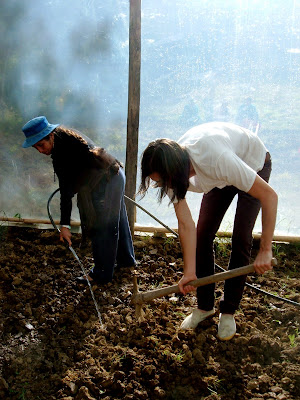In other Ascend Ecuador news, Mark, Tyler and I met with an agricultural specialist this past week to discuss the logistical side of our proposed sustainable agriculture project in Quingeo. Luckily, Mark has a degree in Agriculture, because I doubt that Tyler nor I would have understood the technical details of that conversation any better in English.

We'll begin with test patches of soil, one here in Cuenca and the other high in the mountains, in Allpacruz. We must be meticulous in which crops we choose to promote in this project in order to achieve long-term sustainability. The climatology of the Azuay Province here in the Ecuadorian Andes is intriguing and peculiar. Here in Cuenca, we are surrounded by a multitude of micro-climates. For example, a 1-hour jaunt to the northeast leaves you in a drier, fertile valley, where you will probably want to go swimming because of the heat. Here in Cuenca, on the other hand, the nights are relatively cold, it rains almost every day, and the temperature hovers around 60 degrees constantly. You'll probably want to go out with a jacket. If we head 30 km west of the city, into Cajas National Park, we'll find ourselves in a jagged tundra landscape of hills and valleys that tops out at 14,599 ft above sea level, where no one in their right mind would plant anything.

Consequently, before we promote certain seeds for our agricultural project in Quingeo, we are going to test short-cycle crops and compare results in the different micro-climates, in order to achieve the maximum long-term benefit in Allpacruz. Please check back for updates on this project.

Additionally, Ascend Ecuador is planning to expand operations to some new communities. The whole crew went on a scouting mission to nearby Paute last Friday, where we met with a few community leaders to discuss potential projects and assess the needs of the area. We'll be meeting again with the communities this weeks to further explore options in Tomebamba and Gualaceo. This is the first step for Ascend in initiating a new operation: meet with the villagers, assess their needs, listen to their personal accounts of the situation, and determine how we can most effectively assist local residents to ascend out of poverty.

On the lighter side, I am being put to shame by 7 year-olds on the concrete fútbol field after English classes each week in Quingeo. Playing soccer with little kids in the mountain villages is by far the most fun thing to do in Ecuador, besides eating Guinea Pigs. Please stay tuned for updates on our new communities and the sustainable agriculture projects. If you are reading this, please share this blog with a friend!

We'll begin with test patches of soil, one here in Cuenca and the other high in the mountains, in Allpacruz. We must be meticulous in which crops we choose to promote in this project in order to achieve long-term sustainability. The climatology of the Azuay Province here in the Ecuadorian Andes is intriguing and peculiar. Here in Cuenca, we are surrounded by a multitude of micro-climates. For example, a 1-hour jaunt to the northeast leaves you in a drier, fertile valley, where you will probably want to go swimming because of the heat. Here in Cuenca, on the other hand, the nights are relatively cold, it rains almost every day, and the temperature hovers around 60 degrees constantly. You'll probably want to go out with a jacket. If we head 30 km west of the city, into Cajas National Park, we'll find ourselves in a jagged tundra landscape of hills and valleys that tops out at 14,599 ft above sea level, where no one in their right mind would plant anything.

Consequently, before we promote certain seeds for our agricultural project in Quingeo, we are going to test short-cycle crops and compare results in the different micro-climates, in order to achieve the maximum long-term benefit in Allpacruz. Please check back for updates on this project.

Additionally, Ascend Ecuador is planning to expand operations to some new communities. The whole crew went on a scouting mission to nearby Paute last Friday, where we met with a few community leaders to discuss potential projects and assess the needs of the area. We'll be meeting again with the communities this weeks to further explore options in Tomebamba and Gualaceo. This is the first step for Ascend in initiating a new operation: meet with the villagers, assess their needs, listen to their personal accounts of the situation, and determine how we can most effectively assist local residents to ascend out of poverty.

On the lighter side, I am being put to shame by 7 year-olds on the concrete fútbol field after English classes each week in Quingeo. Playing soccer with little kids in the mountain villages is by far the most fun thing to do in Ecuador, besides eating Guinea Pigs. Please stay tuned for updates on our new communities and the sustainable agriculture projects. If you are reading this, please share this blog with a friend!
Tomebamba/Allpacruz, Ecuador. May 2009. (Photos: Caleb Braley/Judd Hardy)








